***
N. China
Day 7 - 5th November - Pingyao: Walls, Qing Xu Guan temple, Armed Escort Agency (Part 1)
Today, Charis and I visited the Chinese city of Pingyao, the only city in China to retain its full set of city walls (interestingly, it's twinned with Provins, which is almost there with the walls). In the Qing dynasty, Pingyao was a financial centre. As with Provins, its falling out of the currents of history had preserved it.
She posed as a PRC, and I posed as her foreign friend, which worked out well.


Soft sleeper
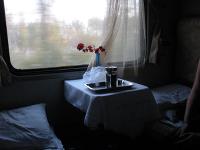
I think this is the Chinese train company's idea of luxury - fake flowers (and a dustbin below). The hot water flask on the table belonged to someone else in the cabin, but there was a large metal flask on the floor too.
A woman in the train told us to be careful of crooks in Ping Yao. I was amused, as that advice was good for the whole of China.
At the train station there I encountered another French couple who planned to stay in Pingyao for 2 days. I thought good luck, as there wasn't really enough to do for 2 days (perhaps if they moved slowly and took many coffee breaks, there would).
At the train station, someone tried to cheat us (another cheat - no surprise). He claimed that the city of Pingyao was 40 minutes' walk from the train station, and offered to take us there in his vehicle (an electric cart IIRC) for a mere 2¥. This was obviously bullshit, as even an honest vendor (if you could find one in China) would not charge you 2¥ for a distance equivalent to a 40 minute walk. Hell, even 40 minutes of crawling would probably cost you at least 4¥ (at least before bargaining).
Nonetheless, we decided 4¥ was reasonable to save some time, so we got on. As expected, the distance turned out to be 10-15 minutes worth of walking. Yet, the driver again tried to cheat us, driving into the city and parking outside a mansion, claiming that it was the ticket booth for admission to the city. We were very suspicious, as it looked like an individual attraction rather than an admission booth, so we got off and declined to enter, making our way back outside the city walls (to admire them, if nothing else).
There was a cute dog which kept following us. I speculated that it was the biscuits which Charis was eating (or perhaps my camera). It also shivered in a very cute way. But when I filmed it, it refused to do those things. Grr:
Contrary dog
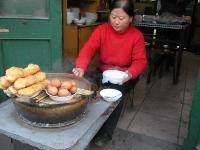
Snack/breakfast vendor
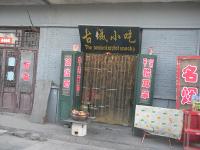
"The ancient city of snacks"
It looks like they used a translator. It should read: "Snack place of the Old City"
At the REAL admission booth I decided to get an audioguide, as I (correctly) foresaw that English information panels would be less common here than elsewhere. The audioguide was not bad, except that it had a VERY annoying habit of resetting and giving me an introduction to Pingyao for the umpteenth time wherever I was in the town (even in the middle).
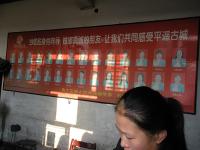
List of tour guides on the wall of the admission booth. Notice that they're all women. And that they have no names, only serial numbers. The motto on the top has the cheek to say that they'll become your genuine friends.
Pingyao used to be called Pingtao, but Tao was the Emperor's name so they had to change it.
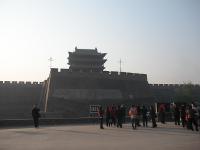
North Gate

This was the sunken area in front of the tower in the previous photo
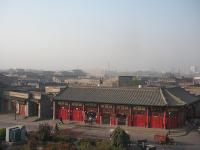
The grey industrial landscape of Pingyao. The coal fumes don't help the grey decor, but at least it's authentic.
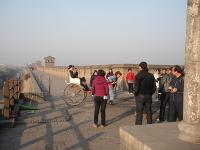
Amusing vendor on top of the North Gate
He would strike a post (of being in mid-stride), with his rickshaw, for people to take photos of. However the getup was incongrous - the passenger is dressed like a Shanghai Businessman of the 1920s, while the vendor is in Qing Dynasty garb.
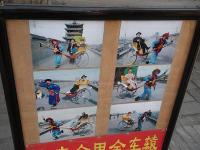
Conned people. I like the black man's expression.
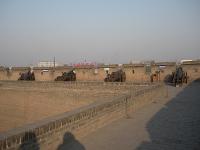
Cannon at North Tower

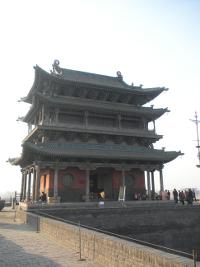
North Tower
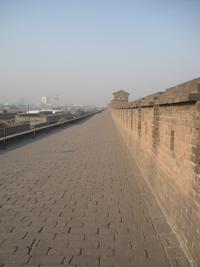
Top of town wall. As you can see, no one else was interested in walking the walls and taking in a lungful of that cool, fresh, coal dust-filled air.
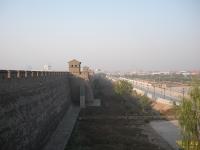
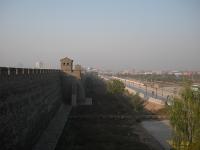
Town walls
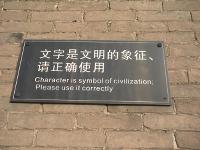
"Character is symbol of civilization ; Please use it correctly"
This was a subtle anti-graffiti message. It took me a few seconds before I understood what it meant.
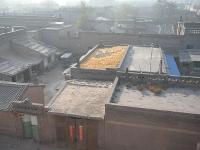
Drying corn cobs on a rooftop
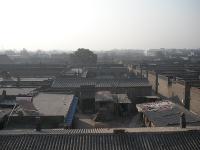
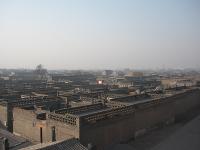
More grey houses in the polluted air
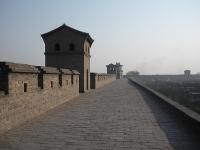
Town wall near one corner (we walked about or almost half of the walls, meeting no one except at the North Tower)
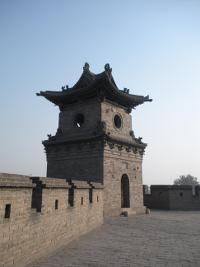
Corner tower
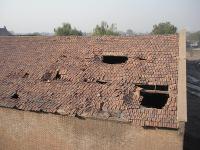
No funds for roof repair
Probably because no one else walked the walls, there wasn't a clearly marked point to climb down. We ended up going through what looked like a private courtyard (luckily the gate wasn't locked).

My notes say "East Temple", but this is a street.
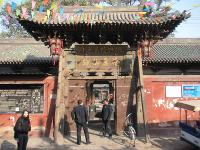
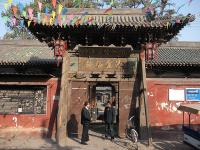

Qing Xu Guan temple
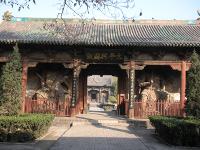
Gate
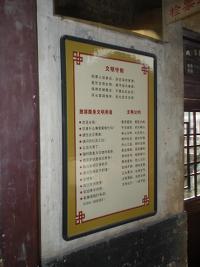
Instructions on how to be civilized.
From the top I like: "Listen to instructions" (听从管理指挥")
From the bottom left (a list of things to say). I like: "Could I ask where the discomfort is?" - apparently they have to be like nurses - as well as "if you have any issues, call this number" (they must get a lot of complaints)
From the bottom right (a lot of four letter words), the best is "见义勇为" )"On viewing virtue, courageously display it"). Sure, it's good to be courageously virtuous. But what does this have to do with a tourist attraction?!
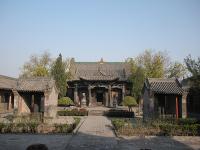
I couldn't find information panels in Mandarin, let alone English

Taoist robes. You can pay 5¥ to pose in them and take a photo
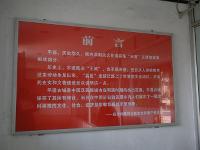
Plaque in one building
It says Pingyao is a shining example of the accomplishments of the Han people during the Ming and Qing dynasties. Even for China (especially for China), that isn't politically correct.
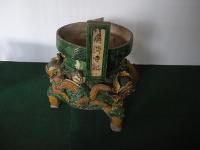
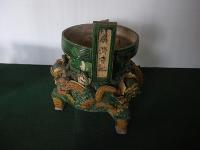
Item with no plaque
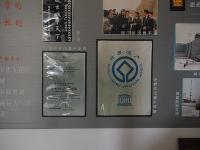
UNESCO material
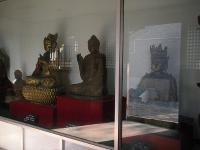
This was bi4 lu2 Buddha, shi4 jia1 Buddha and Guan Yin.
Charis said that Guan Yin was still a male - he just likes to dress as a female. Yet it seems (s)he has a complicated gender identity. Apparently the Lotus Sutra mentions 33 forms of Guan yin, 7 of which are female (one person calls Guan Yin a "Mirror of the Queer Asian Christ" and claims that she "can serve as a mirror of the queer experience". Err, ok).
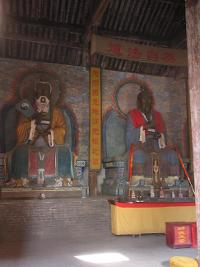
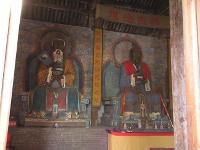
Taoist gods in San Qing Hall
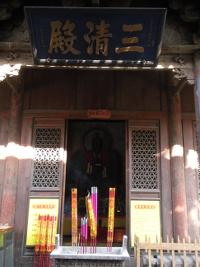
Altar of San Qing Hall
The hall was rebuilt in the reign of Wanli during the Ming dynasty.
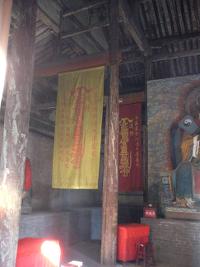
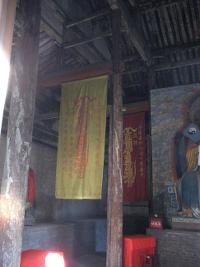
Banners in San Qing Hall
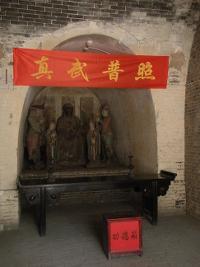
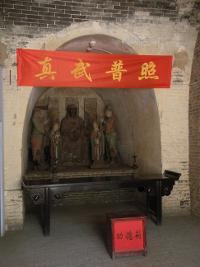
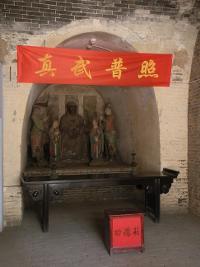
Song/Yuan statues in an alcove in another building (below)
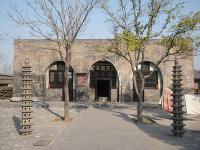
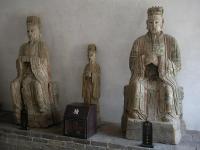
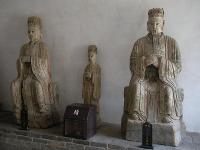
Altar to the pig. I gave 10 Singapore cents and bowed to the Minister and the God
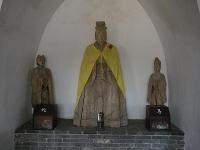
This was the most important statue inside
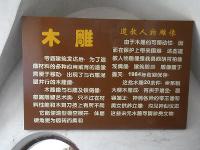
2-in-1 sign. The part on the left talks about wooden carvings resembling and being similar to stone ones. The one on the right says these wooden carvings are curiously alive, and they were kept hidden until 1984.
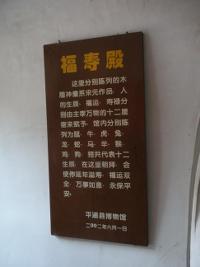
"Lucky longevity hall"
The 12 zodiac animals correspond to 12 stages of life, and paying one's respects here will bring you many blessings

Blurb on Buddhist watercolours
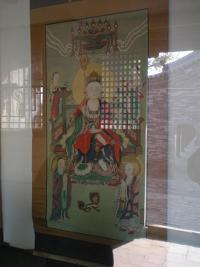
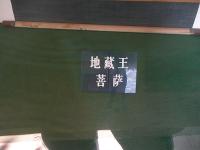
King of the Earth
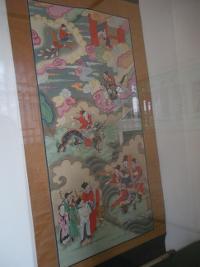
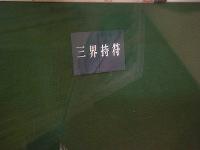
The Three Worlds *something*
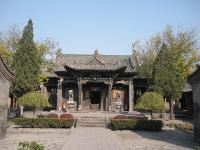
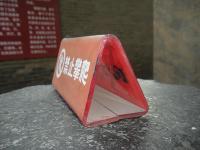
Amusing "no climbing" sign - if you opened it up you'd find a "no photography" sign on the reverse
As an aside: most temple altars and interiors had "no photography" signs. However the loophole was that while you couldn't take pictures *inside* the hall, photography from *outside* it was alright, and no one seemed to mind.
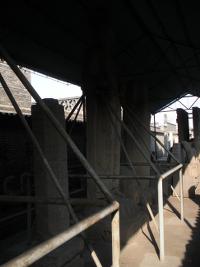

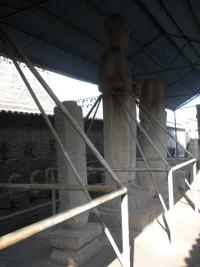
Covered yard with miscellaneous stone statues
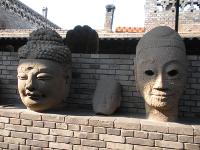
Buddha heads
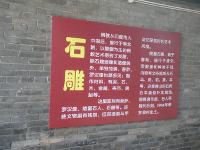
On the evolution of stone carving after Buddhism's coming to China
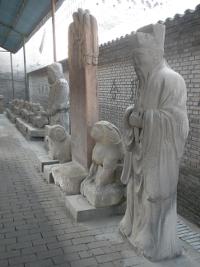
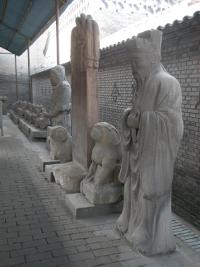
Row of stone statues
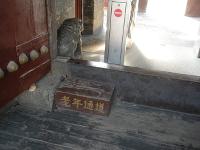
Step for old people to use to get across the wooden doorstep in the gate (which you're not supposed to step on). Charis said I could use this, so I did.
We then left Qing Xu Guan temple.
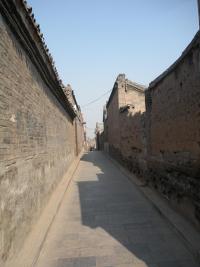
Old alley
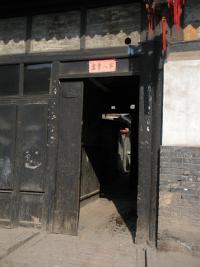
I like the irony: "富贵人家" ("Rich household") is on the lintel, yet it is clear the family living here is poor
We then entered:
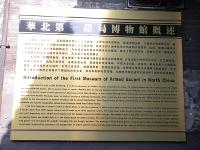
"First Museum of Armed Escort in North China"
In other words, there was something in South China which came earlier.
It was actually advertised as an "escort services agency". This was not what came to mind when the words "escort services agency" ran through my head.
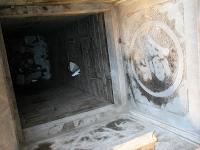
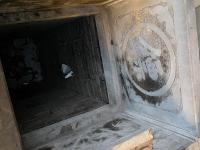
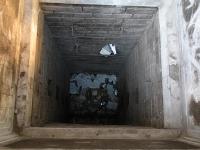
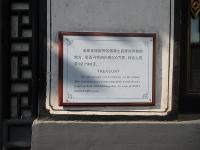
"Treasury"
Presumably this place was guarded, and the 'cave' is not what we see today
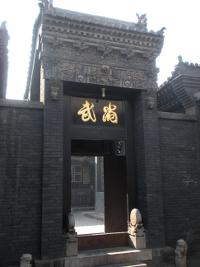
Doorway to martial area

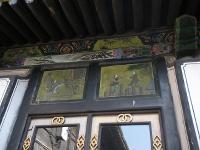
Gungfu scenes, one of which is doubtless fantasy, with another probably so (the two in the first picture)
There was a guy who could kick a horse to death. They named him "iron legs". Dao Guang (a Qing emperor) gave him a jacket. He was one of Northern China's Three Heroes.
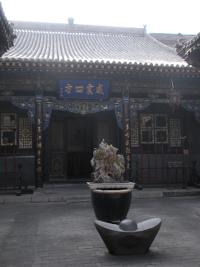
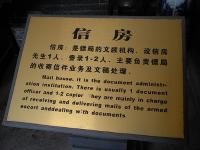
Mail House
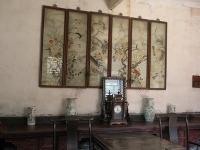
Interior scene
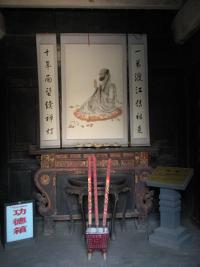
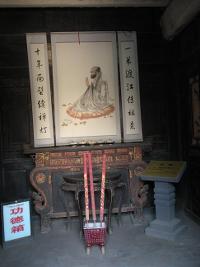
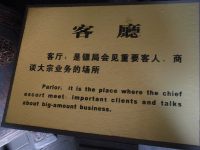
Mail house interior (parlor)
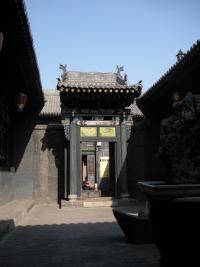
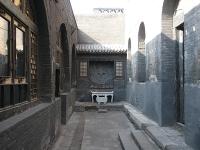
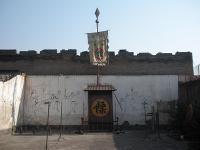
At the back of the complex was an archery range. Charis bargained with the vendor to give us more arrows. In the past it was where they had boxing.
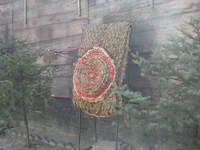
My try at archery: results
Charis the Archer
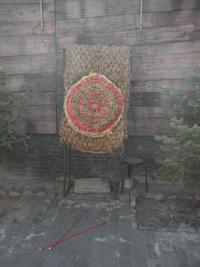
Her results
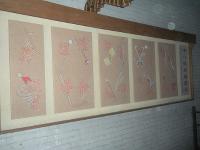
Chinese weapons
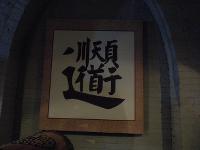
Funky Chinese character. And you thought the normal ones were hard enough to write. There was a mnemonic to write this IIRC.
Charis said the way trains work is the most expensive trains get priority to use the tracks first, and the lowest priority goes to those with no letter.


